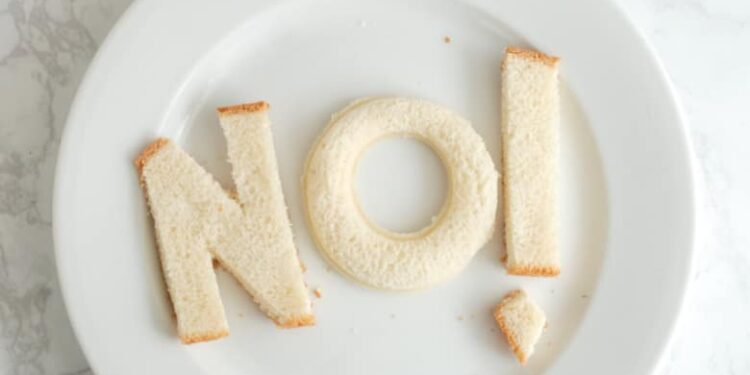Inside: Some vitamin recommendation is flawed, misguided, or simply plain foolish. You’re hereby inspired to disregard these seven ill-advised nuggets.

The world is stuffed with vitamin recommendation–disbursed by dietitians, docs, private trainers, bloggers, mothers on the bus cease, and full strangers in line on the grocery retailer.
A few of it’s good (eat extra leafy greens!). A few of it’s dangerous (keep away from fruit, it’s too sugary!). And a few items of recommendation will get handed round a lot, no one stops to contemplate whether or not they really make any sense.
Listed here are 8 items of vitamin recommendation you’ll be able to formally ignore:
1. Solely store the perimeter.
If I solely shopped the perimeter, I’d eat fruits, greens, fish, milk, meat, eggs, and cheese. And donuts! (The bakery occurs to be on the perimeter of my retailer too.) If I prevented the center aisles, I’d by no means once more purchase beans, lentils, brown rice, complete grain pasta, olive oil, nuts, nut butters, oatmeal, canned tomatoes, complete grain bread, spices, frozen fruit, flaxseed, darkish chocolate, or cereal. And we’d by no means floss once more both.
Clearly, the intention of this recommendation was to encourage folks to eat extra complete, unprocessed meals. However although a whole lot of extremely processed meals stay in these center aisles, so do a whole lot of wholesome staples.


2. Keep away from components you’ll be able to’t pronounce.
Many individuals are searching for out merchandise with less complicated ingredient lists. That’s all properly and good, however there are many components with prolonged or scary-sounding names that aren’t dangerous, like acetic acid (vinegar) and ascorbic acid (vitamin C).
Sodium bicarbonate appears like a dangerous chemical, however it’s really baking soda. You’ll spot lactobacillus acidophilus, on the label of some yogurts– a mouthful of a reputation, however it’s a pressure of helpful micro organism that’s good for the intestine. Some merchandise are additionally fortified with vitamins which are vital for well being however occur to have complicated names, like cyanocobalamin (vitamin B12) and calciferol (vitamin D).
3. Solely purchase natural.
It’s far more vital to purchase and eat fruit and veggies than whether or not you get natural or typical. Researchers haven’t discovered proof that natural produce is more healthy when it comes to vitamin or that consuming natural is healthier for long-term well being.
What is thought for positive: Diets wealthy in fruit and veggies are good for everybody. Even the Environmental Working Group, greatest identified for its Soiled Dozen listing, says “EWG all the time recommends consuming fruit and veggies, even conventionally grown, as a substitute of processed meals and different much less wholesome alternate options.” So purchase the produce you’ll be able to afford and serve it usually.


4. Schedule ‘cheat’ days.
I’m not a fan of the time period “dishonest” with regards to consuming. Ditto for the phrases “I used to be good”, “I used to be dangerous”, or “I’m on a food regimen”. A food regimen so restrictive that you simply want to spend an total day consuming all of the meals you’re usually not allowed to have just isn’t sustainable in the long run. It units you up for failure, which makes you are feeling dangerous about your self–and drives you straight towards the very meals you’re attempting to restrict.
It’s okay to plan a particular consuming event, like a visit to the ice cream store along with your youngsters on the weekend. However not since you’re “dishonest” or “being dangerous”.
Get Extra: I Went on a Weight loss plan. Right here’s What Occurred.
5. Swap to sea salt for much less sodium.
By weight, sea salt and common desk salt include comparable quantities of sodium. Kinds of sea salt which have massive, coarse granules might have much less sodium per teaspoon just because you’ll be able to’t get as many granules within the measuring spoon. Whereas we’re at it, brown eggs aren’t any higher for you than white (they’re simply laid by a unique breed of hen). Ditto for white sugar and brown sugar (brown sugar is just white sugar with molasses added to it).
Get Extra: Is Salt Dangerous for You? Right here’s the Shocking Reality.


6. Don’t eat something white.
This appears to be one thing persons are listening to from their household docs, who’re most likely suggesting that they reduce out bread and pasta to drop pounds. But it surely’s not nice recommendation. It’s true that pigments that give coloration to plant meals have health-protecting qualities. However white fruits and veggies even have helpful compounds in them too, together with meals some folks consider as nutritionally wimpy like white potatoes (they’re really excessive in vitamin C and fiber) and even celery (it’s obtained an honest quantity of vitamin C and folate).
And although white bread and white pasta have much less vitamin than their complete grain counterparts, they definitely aren’t devoid of vitamins. So in case your child is caught on white bread and pasta, relaxation assured they’re nonetheless getting vitamin on their plate.
7. Don’t eat something processed.
A lot recommendation about processed meals is unrealistic, like “keep away from something in a bundle”. As if! Until you reside on a farm and spend all day within the kitchen, that’s inconceivable. Reality is, most meals are processed indirectly, together with loads of wholesome staples, since processing consists of canning, freezing, and chopping.
A extra correct and useful approach to think about meals is the diploma of processing they’ve undergone. Extremely-processed meals have extra components like dyes, stabilizers, and emulsifiers, and include little or no intact, unprocessed meals (like hen nuggets, soda, and boxed cereal). They are typically excessive in energy, low in vitamins, and related to some well being dangers. So it is sensible to eat fewer of them.
Get Extra: You Don’t Need to Keep away from Processed Meals. Right here’s What to do As an alternative.










Discussion about this post